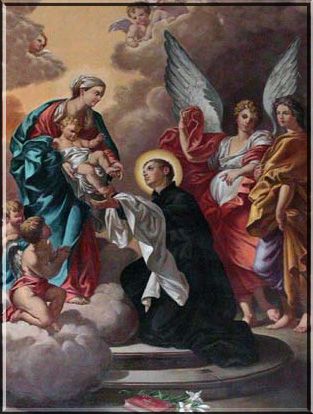Stanislaus' father was a senator of the Kingdom of Poland and castellan of Zakroczym. He was the second of seven children. His older brother Paul survived to be present at the beatification ceremony of Stanislaus in 1605. At home, the two brothers were taught with firmness, even severity; its results were their piety, modesty, and temperance.
On 25 July 1564, the two brothers arrived at Vienna with their tutor to attend the Jesuit college. Stanislaus was soon conspicuous among his classmates during his three years of schooling, not only for his amiability and cheerfulness of expression, but also for his growing religious fervour and piety. His brother Paul said during the process of beatification that "He devoted himself so completely to spiritual things that he frequently became unconscious, especially in the church of the Jesuit Fathers at Vienna." One of the practices of devotion which he joined while at Vienna was the Congregation of St. Barbara and Our Lady, "of which he, with numbers of the pupils of the Society of Jesus" also belonged. Stanislaus alleged to a fellow-member of the Society at Rome that Saint Barbara brought two angels to him during the course of a serious illness, in order to give him the Eucharist. His tutor, John Bilinski, witnessed the miracle, and though he himself did not see what Stanislaus claimed to see, he "was certain that Stanislaus was not at all out of his mind through the violence of his sickness."
Exasperated by his younger brother's piety, Paul began to mistreat Stanislaus. Stanislaus suffered the unjust treatment with remarkable stoicism and patience, but "one night after Stanislaus had again suffered the harsh comments and blows of his brother, he turned on Paul with the words: 'Your rough treatment will end in my going away never to return, and you will have to explain my leaving to our father and mother.' Paul's sole reply was to swear violently at him."
The thought of joining the Society of Jesus had already entered the mind of the saintly young man. It was six months, however, before he ventured to speak of this to the superiors of the Society. At Vienna they hesitated to receive him, fearing the tempest that would probably be raised by his father against the Society, which had just quieted a storm unleashed by other admissions to the Company. Another Jesuit suggested he go to Augsburg, Germany where Peter Canisius was provincial. The distance was over four hundred miles, which had to be made on foot, without equipment or guide or any other resources but that did not deter him.
On the morning of the day on which he was to carry out his project he called his servant to him early and told him to notify his brother Paul and his tutor in the course of the morning that he would not be back that day to dinner. Then he started, exchanging the dress of gentleman for that of a mendicant, which was the only way to escape the curiosity of those he met. By nightfall Paul and the tutor comprehended that Stanislaus had fled, as he had threatened. They were seized with a fierce anger, and as the day was ended the fugitive had gained a day over them. They started to follow him, but were not able to overtake him; either their exhausted horses refused to go further, or a wheel of their carriage would break, or, as the tutor frankly declared, they had mistaken the route, having left the city by a different road from the one which Stanislaus had taken.
Stanislaus stayed for a month at Dillingen, where the provincial of that time, Saint Peter Canisius, put the young aspirant's vocation to the test by employing him in the boarding-school. He arrived 25 October 1567 in Rome. As he was greatly exhausted by the journey, the general of the order, Saint Francis Borgia, would not permit him to enter the novitiate of Saint Andrew until several days later. During the ten remaining months of his life, according to the testimony of the master of novices, Father Giulio Fazio, "he was a model and mirror of religious perfection. Notwithstanding his very delicate constitution he did not spare himself the slightest penance". He had such a burning fever in his chest that he was often obliged to apply cold compresses."
On the evening of the feast of Saint Lawrence, Stanislaus fell ill with a high fever, and clearly saw that his last hour had come. He wrote a letter to the Blessed Virgin begging her to call him to the skies there to celebrate with her the glorious anniversary of her Assumption. His confidence in the Blessed Virgin, which had already brought him many favours, was this time again rewarded; on 15 August 1568, towards 4:00 in the morning, while he prayed he died. Many in the city proclaimed him a saint and people hastened from all parts to venerate his remains and to obtain, if possible, some relics.
The Holy See ratified his beatification in 1605; he was canonized in 1726. St. Stanislaus is a popular saint of Poland, and many religious institutions have chosen him as the protector of their novitiates. The representations of him in art are quite varied; he is sometimes depicted receiving Holy Communion from the hands of angels, or receiving the Infant Jesus from the hands of the Virgin, or in the midst of a battle putting to flight the enemies of his country. At times he is depicted near a fountain putting a wet linen cloth on his breast. He is invoked for palpitations of the heart and for dangerous cases of illness.
On 15 August 2018 Pope Francis wrote to the Bishop of Płock in honor of the 450th anniversary of Stanislaus's death. In his message, Pope Francis cites a maxim of Stanislaus's: “Ad maiora natus sum – 'I was born for greater things'".
